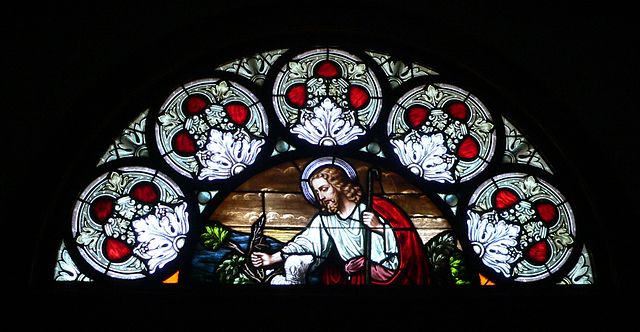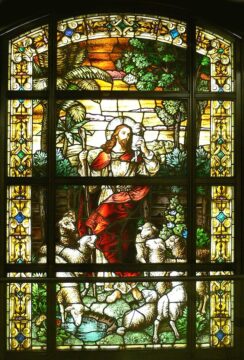Franciscan Friar Fr. Paul Gallagher reflects on the Gospel text for the Eleventh Sunday of Ordinary Time. What do you think the twelve disciples, who Jesus first summoned and then named as apostles, were experiencing as Jesus named them and told them that he was giving them authority over unclean spirits? What are some of the things they might have been feeling as he sent them out to the lost sheep?
The content is edited by Franciscan Sister of Christian Charity Sister Anne Marie Lom and Joe Thiel. The excerpts from the Sunday readings are prepared by Joe Thiel. To read or download the complete pdf with excerpts for your prayer, please click here Franciscan Gospel Reflection June 18 2023. Excerpts are from the Lectionary for Mass for Use in the Dioceses of the United States of America, second typical edition © 2001, 1998, 1997, 1986, 1970 Confraternity of Christian Doctrine, Inc., Washington, DC. Used with permission. All rights reserved. No portion of this text may be reproduced by any means without permission in writing from the copyright owner. Photos: https://upload.wikimedia.org/wikipedia/commons/a/a5/St._Leonard_church_%28Madison%2C_Nebraska%29_window_over_main_door.JPG; Window: workshop of Franz Borgias Mayer (1848–1926); Photo: Andreas Praefcke, Public domain, via Wikimedia Commons
Matthew 9:36-10:8
 At the sight of the crowds, Jesus’ heart was moved with pity for them because they were troubled and abandoned, like sheep without a shepherd. Then he said to his disciples, “The harvest is abundant but the laborers are few; so ask the master of the harvest to send out laborers for his harvest.”
At the sight of the crowds, Jesus’ heart was moved with pity for them because they were troubled and abandoned, like sheep without a shepherd. Then he said to his disciples, “The harvest is abundant but the laborers are few; so ask the master of the harvest to send out laborers for his harvest.”
(Chapter 10) Then he summoned his twelve disciples and gave them authority over unclean spirits to drive them out and to cure every disease and every illness. The names of the twelve apostles are these: first, Simon called Peter, and his brother Andrew; James, the son of Zebedee, and his brother John; Philip and Bartholomew, Thomas and Matthew the tax collector; James, the son of Alphaeus, and Thaddeus; Simon from Cana, and Judas Iscariot who betrayed him.
Jesus sent out these twelve after instructing them thus, “Do not go into pagan territory or enter a Samaritan town. Go rather to the lost sheep of the house of Israel. As you go, make this proclamation: ‘The kingdom of heaven is at hand.’ Cure the sick, raise the dead, cleanse lepers, drive out demons. Without cost you have received; without cost you are to give.
Background:
Last week we celebrated The Most Holy Body and Blood of Jesus, Corpus Christi. The Gospel for that feast was taken from John’s Gospel. In that Gospel text Jesus declared that he was the living bread that has come down from heaven. John also recorded the reaction of the Jews to Jesus’ teaching, saying that they quarreled among themselves, asking how Jesus could give them his flesh to eat.
This Sunday we return to Ordinary time and resume with the 11th Sunday. The Gospel text is from Matthew and there is a shift in the mood of the text. Here the Jews are not quarreling about Jesus’ teaching, but Jesus is calling the disciples and they are responding.
Previously in Matthew’s Gospel Jesus invites Matthew, a tax collector, to follow him. The Pharisees question Jesus’ association with Matthew and other sinners. Jesus then encounters disciples of John the Baptist who question the fact that he and his disciples do not fast. Matthew describes an occasion when a court official asks that Jesus come and lay hands on his daughter who has just died. On the way to his house, a woman touches Jesus’ garment hoping to be cured of her hemorrhaging and is cured. Jesus restores life to the daughter of the official. Then Jesus heals two blind men and casts an evil spirit out of a mute. Matthew says that Jesus looked at the crowd that had gathered and was moved with compassion for them. This is where the Gospel text for this Sunday begins.
 The first part of the Gospel text describes Jesus being moved by the sight of the crowd. Matthew does not describe the particular situation in the crowd to which Jesus is referring. There is no indication of a particular person, a group of people, or the general state of the people that moved Jesus. Without a clear understanding of the crowd, the focus of attention moves to the compassion of Jesus. The verb used, “splanchnizomai,” denotes an agitation that is at the very depths of a person: one’s loins or womb. This would connote Jesus having an emotional bond of love, as for a daughter or son. The crowd is described as being like sheep without a shepherd, which means without proper guidance and in danger of going astray or falling into some peril. Jesus uses the familiar image of the harvest without enough workers to describe the situation. In both Jewish and Christian tradition, the harvest is a common image for the end time when both the good and the evil will be gathered and then separated. In the 13th chapter of his Gospel, Matthew has collected four parables about the realm of God. Two of them are concerned with the gathering at harvest and two contain images of the good being gathered with the wicked. This need for people to be “gathered” in order to be included in God’s reign leads Jesus to act by summoning twelve disciples and giving them authority before sending them out.
The first part of the Gospel text describes Jesus being moved by the sight of the crowd. Matthew does not describe the particular situation in the crowd to which Jesus is referring. There is no indication of a particular person, a group of people, or the general state of the people that moved Jesus. Without a clear understanding of the crowd, the focus of attention moves to the compassion of Jesus. The verb used, “splanchnizomai,” denotes an agitation that is at the very depths of a person: one’s loins or womb. This would connote Jesus having an emotional bond of love, as for a daughter or son. The crowd is described as being like sheep without a shepherd, which means without proper guidance and in danger of going astray or falling into some peril. Jesus uses the familiar image of the harvest without enough workers to describe the situation. In both Jewish and Christian tradition, the harvest is a common image for the end time when both the good and the evil will be gathered and then separated. In the 13th chapter of his Gospel, Matthew has collected four parables about the realm of God. Two of them are concerned with the gathering at harvest and two contain images of the good being gathered with the wicked. This need for people to be “gathered” in order to be included in God’s reign leads Jesus to act by summoning twelve disciples and giving them authority before sending them out.
After being called, they are immediately given power similar to that which Jesus himself exercised over evil. Then they are sent. They are sent to the lost sheep of Israel. This does not mean that the non-Jews were to be excluded. Recall that, for the feast of the Ascension, we heard Jesus commission his disciples “…make disciples of all nations, baptizing them in the name of the Father, and of the Son, and of the Holy Spirit, teaching them to observe all that I have commanded you. And behold, I am with you always, until the end of the age.” (Matthew 28:19-20) The lost sheep may be either a reference to those who need to return to the Lord or to those who are on the fringe of society, i.e. poor, widows, and lepers. The exhortation to give without expecting repayment would be heard as very counter-cultural. In this society all gifts carried with them the expectation of repayment.
Reflection Questions:
- Recall a time when your heart was moved for another. Recall as much about the situation as you are able. What was it like for you now to recall your being so moved?
- Can you list some things that Jesus might have seen in the crowd that day that would have moved his heart to pity?
- What do you think it was like for Jesus to experience himself being so moved?
- Do you think that Jesus’ experience of the crowd and himself led in some way to him calling the disciples to be not just disciples but apostles?
- What do you think the twelve disciples, who Jesus first summoned and then named as apostles, were experiencing as Jesus named them and told them that he was giving them authority over unclean spirits? What are some of the things they might have been feeling as he sent them out to the lost sheep?
- What goes through you as you read the names of those apostles?
- Who are the troubled and abandoned in your world, in your parish, in your family?
- Can you take some time now just to talk with Jesus or God about what you are experiencing in this Gospel reading?


